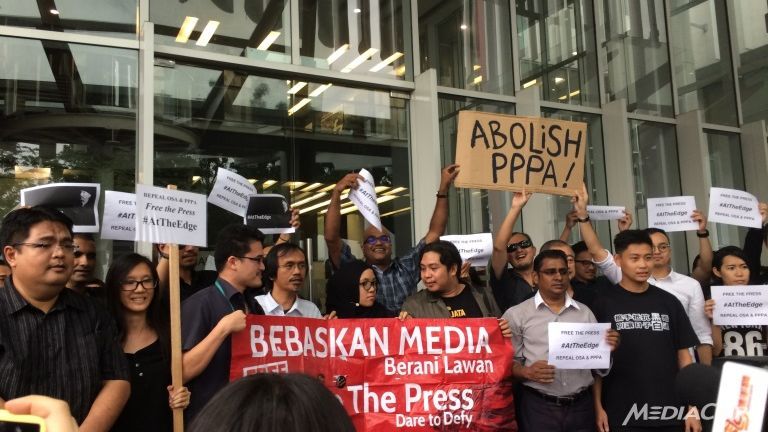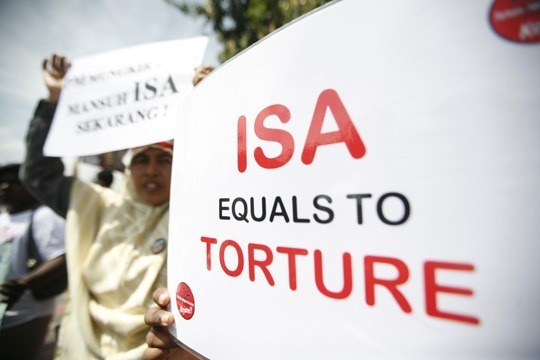Why Did Malaysia Fall Under The "Flawed Democracy" Category?
59 countries out of 167 in the world fall under the category of "flawed democracy".
According to a report released by UK's Economist Intelligence Unit (EIU), Malaysia's democratic system falls under the category of "flawed democracy"
The Bersih 4.0 rally that was held late last year, August 2015 was one of the biggest protests held in the country for better democracy and fair elections
Image via Malaya ChroniclesThe survey from EIU states that, Malaysia is now 68th out of the 167 countries measured, after it scored 6.43 in the index, down from 65th in 2014, putting it behind Indonesia (49th) and the Philippines (54th), but ahead of 74th placed Singapore.
“These countries also have free and fair elections and, even if there are problems (such as infringements on media freedom), basic civil liberties are respected.
“However, there are significant weaknesses in other aspects of democracy, including problems in governance, an underdeveloped political culture and low levels of political participation,” the EIU explained.
What is the Democracy Index?
Malaysia is at the 67th place, categorised under "flawed democracies"
Image via Economist Intelligence UnitIt is an index compiled by the Economist Intelligence Unit, an independent business that provides analysis on country reports, economic forecasts, financial and industry reports.
The Democracy Index basically measures the state of democracy in a total of 167 countries, with 165 of it being United Nations member states.
The state of democracy in these countries are measured according to five different categories, namely; electoral process and pluralism, civil liberties, functioning of government, political participation and political culture. These categories will then be used to measure the overall pluralism, civil liberties and political culture in a country with a set of 60 questions.
Based on the scores, the countries will be placed under five separate categories; full democracies, flawed democracies, hybrid regimes and authoritarian regimes.
The EIU also states that there are a number of questions that are considered crucial for the survey and a low score on them would yield a penalty on the total score for each category
The questions are:
1. Whether national elections are free and fair
2. The security of voters
3. The influence of foreign powers on the government
4. The capability of the civil servants to implement policies
The past few years have seen Asian countries falling in 4th rank of the democracy index, with North America topping the list and authoritarian regimes in Middle East and North Africa taking the last place in the index.
What is a "flawed democracy"?
Flawed democracy is defined as countries that manage to run free and fair elections, respect basic civil liberties but has a low level of political participation, weakness of governance which leads to an underdeveloped political culture.
Along with Malaysia, a large number of well-developed countries including Italy, Belgium, Japan, France, Singapore, and Hong Kong fell under this category last year, 2015.
The report states that Malaysia's ranking was dragged down heavily by its low score for political participation (5.56) and civil liberties (5.59)
“Flawed democracies” are the plurality among nations measured, with 59 of the 167 countries in the ranking falling into this category. The next biggest is “authoritarian regimes”, with 51 countries; at just 20, “full democracies” was the smallest group.
Low public interest in politics was not unique to Malaysia, however, with the EIU calling it a “crisis of public participation” worldwide, which it said was most prevalent in developed countries.
“Democracy is more than the sum of its institutions… A culture of passivity, leading to an obedient and docile citizenry, is not consistent with the healthy functioning of democracy,” the EIU said.
The analysis further revealed that a total of 61 countries improved their rankings in 2015, compared to the year 2014
In terms of the annual improvement in the regional average score (from 5.70 to 5.74), Asia was, together with SSA, the best-performing region in 2015.
However, it also experienced some setbacks, as Japan and South Korea slipped into the “flawed democracies” category as a result of a very small change in their scores.
Some of the middle-ranking countries, such as Sri Lanka, rose up the rankings owing to improvements in governance and accountability.
Rising media censorship and the lack of accountability of ruling governments have been named as some of the main reasons on why most Asian countries cease to have a healthy democratic system
Malaysians journalist rallying for press freedom following the government's move to suspend the publishing license of The Edge due to their report on the 1MDB scandal
Image via Channel News AsiaThe past few years have seen local politicians speaking a lot about democracy and abolishing ironclad laws such as the Internal Security Act (ISA) 1960 which allows the government to detain any individual suspected of terrorism activities or disrupting the nation's peace without any trial or specific criminal charges.
After much objection, Prime Minister Najib Razak abolished the ISA but replaced it with the equally limiting Security Offences (Special Measures) Act 2012 (SOSMA).
Ever since the 2008 general elections, Malaysians have been actively participating in the local political scene, with many even joining street rallies fighting for better democracy, free and fair elections and press freedom.




